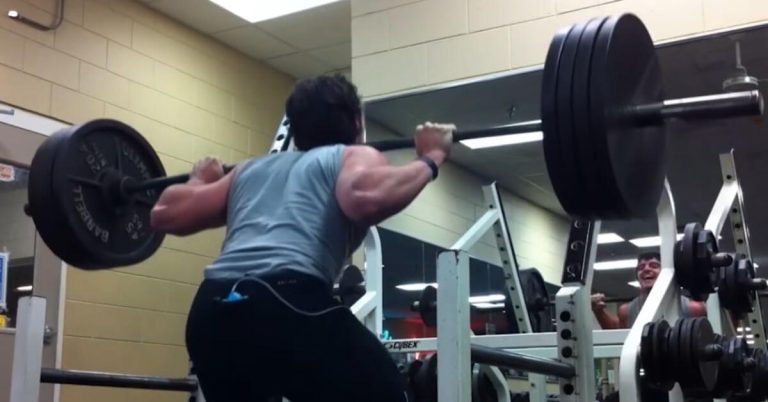Why is My Bench Getting Weaker? Unveiling the Hidden Reasons
Last Updated on December 1, 2023 by Justin Harris
Why is My Bench Getting Weaker: Your bench press may be getting weaker due to factors such as overtraining, inadequate rest and recovery, improper form, fatigue, or a poor-quality diet. These factors can lead to muscle weakness and a decline in performance.

It is important to listen to your body, allow sufficient rest, and ensure proper nutrition to prevent strength loss and optimize your bench press. Additionally, maintaining a balanced and varied bench program can help strengthen your bench press and prevent fluctuations in strength.
Read Also: Why Do I Feel Incline Bench in My Shoulders?
Muscle Loss And Its Impact On Bench Press Strength
One of the most common reasons people see a decline in their bench press strength is overtraining. Signs of overtraining include constant fatigue, decline in performance, and even injuries. Rest and recovery are essential for allowing your muscles enough time to repair and rebuild. In addition, muscle loss can occur after two to three weeks of inactivity, depending on the reason for the break.
If you are sick or overstressed, you may start to lose strength after this period. To prevent muscle loss, it is important to maintain a consistent workout routine and ensure you are getting enough sleep for muscle recovery and growth. Proper form and technique are also crucial in maintaining and improving bench press strength. Lastly, a well-balanced and nutritious diet can provide the necessary fuel for muscle growth and strength.
Weaknesses That Cause Decline In Bench Press Strength
One common reason for a decline in bench press strength is overtraining, which can lead to constant fatigue and a decrease in performance. Other factors such as improper form, fatigue from over-training, or a poor-quality diet can also contribute to a weaker bench press.
It is important to rest and allow the body to recover in order to prevent further decline in strength.
Bodybuilding Bench Technique
One of the most common reasons for a decline in bench press strength is overtraining. Overtraining can lead to constant fatigue, decline in performance, and even injuries. Sometimes, taking a step back and allowing your body enough time to rest and recover can be the key to moving forward.
Another weakness that can cause a decline in bench press strength is having a weak upper back. Strong upper back muscles provide stability and help with generating power during the bench press. Similarly, having weak triceps can limit your ability to lock out the weight.
Read Also: Why Do I Feel Incline Bench in My Shoulders?
The frequency of your bench press sessions also plays a role in maintaining or improving your strength. If you don’t bench press often enough, your muscles may not adapt and grow stronger. On the other hand, if you bench press too frequently without proper rest, fatigue and muscle weakness can occur.
Bouncing the bar off your chest is a common technique flaw that can lead to a weaker bench press. While some people use this technique to generate more momentum, it actually diminishes the contribution of the chest muscles and can lead to decreased strength gains.
Lastly, underutilizing leg muscles during the bench press can contribute to a weaker lift. Engaging leg drive and pushing through the floor can help generate greater force and improve overall bench press strength.
Other Factors Affecting Gym Performance
One of the most common reasons people see a decline in their bench press strength is overtraining. Signs of overtraining include constant fatigue, decline in performance, and even injuries. It’s important to listen to your body and give it the rest and recovery it needs. Sometimes, taking a step back can actually be the key to moving forward. Additionally, another factor that can affect your gym performance is the importance of sufficient rest and recovery.
You may be getting weaker because you’re not allowing your muscles enough time to recover. Lack of sleep is another crucial aspect that can hinder muscle recovery and growth. Sleep is essential for your body to repair and rebuild muscles. Ensure you are getting enough quality sleep to optimize your bench press strength. By addressing these factors, you can regain strength and improve your bench press performance.
Read Also,
- Spin Bike for Short Person
- Treadmills Under 300.00
- Sauna Vest for Weight Loss
- Elliptical for Short Person
- Best Treadmills Under $2000
- Best Elliptical Under 600
- Best Treadmill Under 200
- Are Air Forces Good for Squatting
- Best Stationary Bikes Under $200
- Why Do Some Cable Machines Feel Heavier
Strategies To Regain Bench Press Strength
One of the most common reasons people see a decline in their bench press strength is overtraining. Signs of overtraining include constant fatigue, a decline in performance, and even injuries. Sometimes, taking a step back and allowing yourself enough rest and recovery can actually be the key to moving forward and regaining strength.
Another factor that can contribute to a weaker bench press is deconditioning. This occurs when you have not been actively engaging in strength training or have taken an extended break from your regular workout routine. In such cases, it is important to gradually reintroduce bench press exercises and slowly increase the weight and intensity to rebuild strength.
In addition to overtraining and deconditioning, improper form can also hamper your bench press strength. It is crucial to ensure that you are using the correct technique and engaging the right muscles during the exercise. Focus on maintaining a stable upper back, a strong grip, and utilizing leg drive for optimal bench press performance.
Fatigue and poor recovery can also contribute to a weaker bench press. Lack of proper sleep and nutrition can negatively impact muscle recovery and growth, resulting in decreased strength. Ensuring that you are getting enough quality sleep and following a nutritious diet that supports muscle growth and repair is essential.
Conclusion
To regain strength in your bench press, it’s important to identify the possible reasons for your decline. Overtraining, fatigue, weak muscles in your upper back or triceps, and improper form could all be contributing factors. Taking a step back to rest and recover, improving your diet, and ensuring proper form can help you overcome this plateau.
Remember, everyone experiences setbacks, so don’t get discouraged. With the right approach and dedication, you can get back on track and start seeing improvements in your bench press.






